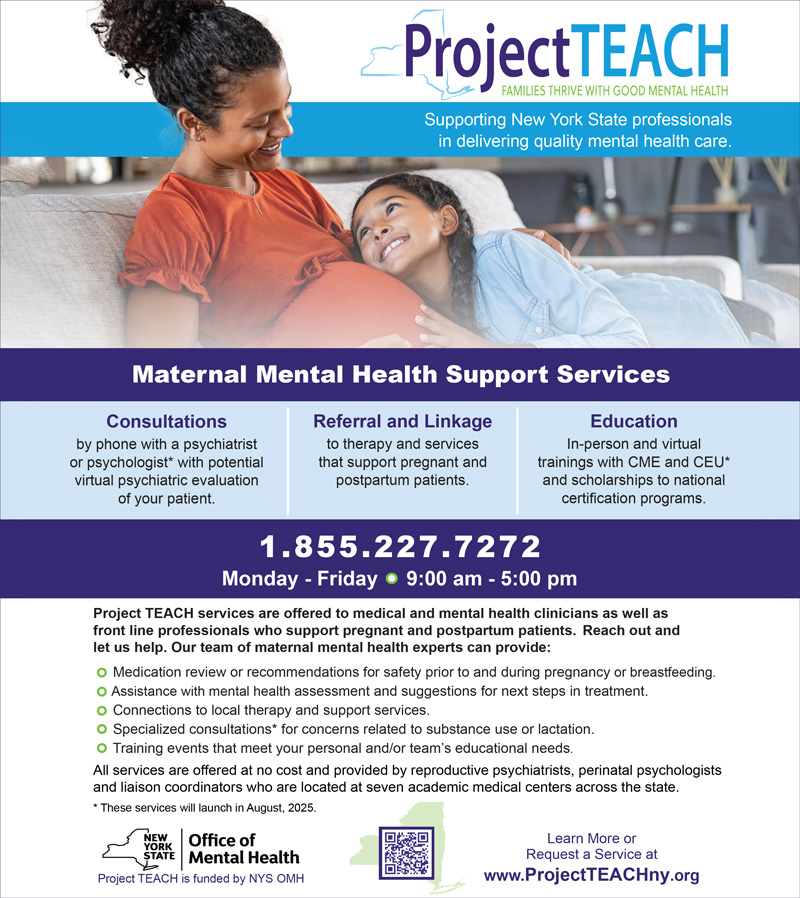Maternal mental health conditions are one of the most common complications of pregnancy and birth, affecting one in five perinatal individuals (1,2) and 800,000 families annually in the United States, with 75% of those affected remaining untreated or undertreated (2). Mental health conditions are the leading cause of maternal mortality in the United States, accounting for 22% of pregnancy-related deaths, with suicide and overdose being the leading causes of death in the first year following pregnancy (3). In New York State, 15% of all pregnancy-related deaths were due to mental health conditions, with 12.2% of all pregnancy-related deaths due to suicide; all pregnancy-related deaths due to mental health conditions were considered preventable (4). The economic impact is also staggering, with untreated maternal mental health conditions costing an estimated $32,000 per mother-infant pair, totaling at least $14 billion annually in the United States (5) and an estimated $997 million in New York State (inclusive of all maternal mental health conditions) of which $598 million is from untreated/undertreated perinatal depression alone (3,5,6).

Untreated maternal mental health conditions are associated with poor prenatal self-care and increased rates of gestational diabetes (7), hypertensive disorders of pregnancy (8) and surgical delivery interventions (9), inadequate maternal-infant bonding (10), poor infant-feeding outcomes (11), and impaired child cognitive, behavioral and emotional development (12). Perinatal individuals of color and those with low incomes are both more likely to experience maternal mental health conditions and less likely to access treatment. High-risk populations include military service members and their spouses, immigrant women, and those lacking social support (2). These disparities underscore the critical need for accessible, culturally responsive care delivery models. The provider shortage worsens these challenges dramatically. Fewer than 500 psychiatrists in the United States are trained in reproductive/perinatal mental health to serve the 800,000 individuals who experience maternal mental health complications annually.
This treatment gap has created an urgent public health crisis that demands innovative, scalable solutions. Perinatal Psychiatry Access Programs have appeared as a transformative approach to bridging the gap, with programs like New York State’s Project TEACH leading the way in expanding access to essential mental healthcare services.
Understanding Perinatal Psychiatry Access Programs
Nationally, Perinatal Psychiatry Access Programs are population-based interventions designed to increase the ability of frontline healthcare providers—including obstetrical providers, pediatricians, family physicians, and even psychiatrists—to effectively identify, assess, and treat maternal mental health conditions. These programs recognize a fundamental reality: pregnant and postpartum individuals have frequent contact with healthcare providers, seeing them 20-25 times during routine pregnancy and the first year of their baby’s life. However, these frontline providers, and even psychiatrists and psychiatric nurse practitioners, often lack the specialized training, knowledge, and resources necessary to address maternal mental health conditions effectively (13).
The programs operate on a workforce development model, providing education, consultation, and support to healthcare professionals rather than trying to treat patients directly. This approach uses existing healthcare infrastructure while maximizing the impact of scarce psychiatric resources. Research has found five core components that these programs may implement: telephone consultation with perinatal psychiatry experts, one-time patient-facing consultations, resource and referral services, training for perinatal professionals, and practice-level technical assistance. Across the United States, programs vary in which components they offer, allowing for customization based on local needs and resources (14).
Project TEACH: A Model for Comprehensive Support
New York State’s Project TEACH exemplifies the comprehensive approach that Perinatal Psychiatry Access Programs can provide. Funded by the New York State Office of Mental Health, Project TEACH serves as both a Child Psychiatry Access Program and a Perinatal Psychiatry Access Program. In recognition of the need for expanded maternal mental health services, New York State Governor Kathy Hochul increased Project TEACH funding in 2025. Project TEACH now includes support to allied healthcare professionals such as therapists, lactation consultants, home visiting nurses, staff of the Special Supplemental Nutrition Program for Women, Infants, and Children, and community mental health workers. Any frontline professional who serves pregnant and postpartum individuals can access specialized training and expert consultation to provide mental health support to the perinatal individuals they work with.
Project TEACH provides three primary service categories designed to support New York State professionals in delivering quality mental health care.
First, Project TEACH offers real-time phone consultations with psychiatrists and psychologists, with the potential for telehealth evaluations of patients. This service allows frontline professionals to access expert guidance when faced with complex cases or uncertainty about treatment approaches. For example, the program’s team of maternal mental health experts can provide medication reviews and safety recommendations for pregnancy and breastfeeding, aid with mental health assessments, and offer specialty consultations for concerns related to substance use or lactation.
Second, the program helps with referral and linkage services. The program’s team of liaison coordinators can help providers and patients connect to therapy and services that support pregnant and postpartum individuals. This component addresses one of the most significant barriers to care: navigating the complex mental healthcare system to find appropriate, available services. By keeping relationships with local providers and understanding community and state resources, Project TEACH can streamline the referral process and, in some cases, work directly with patients, linking them to ongoing care.
Third, Project TEACH provides comprehensive, maternal mental health education through in-person and virtual trainings that offer no-cost continuing medical education and continuing education unit credits. The program also provides scholarships to national perinatal mental health certification programs, investing in long-term workforce development. Maternal mental health trainings can be customized to meet a professional’s personal educational development or to meet the training needs of an organization. This multi-faceted access to education ensures relevant and practical application.
All Project TEACH services are provided at no cost to clinicians, allied health professionals, and patients in New York State. The program operates through seven academic medical centers across the State, ensuring broad geographic reach and using the expertise of reproductive psychiatrists, perinatal psychologists, and maternal mental health liaison coordinators. This distributed model allows the program to serve both urban and rural areas effectively, addressing geographic disparities in access to specialized care.
Increasing Access Through Systematic Change
Perinatal Psychiatry Access Programs like Project TEACH increase care for pregnant and postpartum individuals through several key mechanisms. By building provider capacity, these programs enable more healthcare professionals to screen for, assess, and manage maternal mental health conditions confidently. This distributed care model expands the workforce capable of providing evidence-based treatment, thus addressing the shortage of specialized providers. The consultation component provides crucial safety net support, ensuring that frontline providers can access expert guidance when needed while maintaining primary responsibility for patient care. This approach builds provider confidence and competence over time, creating a multiplier effect as trained providers become more skilled and comfortable managing these conditions independently. Practice-level technical assistance helps healthcare systems implement evidence-based screening and treatment protocols systematically. This organizational change approach ensures that maternal mental health becomes integrated into routine care rather than as an add-on service dependent on individual provider initiative. The education and training components create lasting change by building knowledge and skills across the healthcare workforce. By offering continuing education credits and certification opportunities, programs incentivize participation while ensuring that learning translates into improved patient care.
Empowering all providers to transform maternal mental health, Perinatal Psychiatry Access Programs, like Project TEACH, represent a paradigm shift in maternal mental healthcare delivery, moving from a specialist-dependent model to one that empowers the broader healthcare workforce to provide evidence-based care. By addressing systemic barriers, building provider capacity, and ensuring access to expert consultation, these programs offer hope for closing the treatment gap that affects hundreds of thousands of families annually. As these programs continue to evolve and expand, they hold the promise of transforming maternal mental healthcare from a crisis-driven specialty service to an integrated component of routine perinatal care.
Dr. Kristina M. Deligiannidis is the Medical Director of Reproductive Psychiatry for Project TEACH NY, Director of Women’s Behavioral Health at Zucker Hillside Hospital, Northwell Health, and Professor of Psychiatry, Molecular Medicine, and Obstetrics & Gynecology at the Donald and Barbara Zucker School of Medicine at Hofstra/Northwell.
To learn more or request a no-cost service, visit www.ProjectTEACHny.org or call toll-free at (716) 878-2454.
References
- Vesga-López O, Blanco C, Keyes K, Olfson M, Grant BF, Hasin DS. Psychiatric disorders in pregnant and postpartum women in the United States. Arch Gen Psychiatry. 2008 Jul;65(7):805-15.
- Clarke DE, De Faria L, Alpert JE, The Perinatal Mental Health Advisory Panel, The Perinatal Mental Health Research Team. Perinatal Mental and Substance Use Disorder: White Paper. Washington, DC: American Psychiatric Association; 2023. Available from: psychiatry.org/maternal.
- Trost SL, Beauregard J, Chandra G, Nije F, Berry J, Harvey A, Goodman DA. Pregnancy-related deaths: data from Maternal Mortality Review Committees in 36 US states, 2017-2019 [Internet]. Atlanta (GA): Centers for Disease Control and Prevention. Available from: gov/maternal-mortality/php/data-research/mmrc-2017-2019.html?CDC_AAref_Val=https://www.cdc.gov/reproductivehealth/maternal-mortality/erase-mm/data-mmrc.html
- New York State Department of Health. New York State Maternal Mortality Review Report on Pregnancy-Associated Deaths in 2018. Albany, NY: New York State Department of Health. 2022.
- Luca DL, Margiotta C, Staatz C, Garlow E, Christensen A, Zivin K. Financial toll of untreated perinatal mood and anxiety disorders among 2017 births in the United States. Am J Public Health. 2020;110(6):888-96.
- America’s Health Rankings analysis of U.S. Department for Health and Human Services, Centers for Disease Control and Prevention, National Center for Chronic Disease Prevention and Health Promotion, Division of Reproductive Health, Pregnancy Risk Assessment Monitoring System (PRAMS), United Health Foundation, AmericasHealthRankings.org. Available from: americashealthrankings.org/explore/measures/postpartum_depression?edition-year=2022
- Fischer S, Morales-Suárez-Varela M. The Bidirectional Relationship between Gestational Diabetes and Depression in Pregnant Women: A Systematic Search and Review. Healthcare (Basel). 2023 Jan 31;11(3):404.
- Shay M, MacKinnon AL, Metcalfe A, Giesbrecht G, Campbell T, Nerenberg K, Tough S, Tomfohr-Madsen L. Depressed mood and anxiety as risk factors for hypertensive disorders of pregnancy: a systematic review and meta-analysis. Psychol Med. 2020 Oct;50(13):2128-2140.
- Zochowski MK, Kolenic GE, Zivin K, Tilea A, Admon LK, Hall SV, Advincula A, Dalton VK. Trends In Primary Cesarean Section Rates Among Women With And Without Perinatal Mood And Anxiety Disorders. Health Aff. 2021 Oct;40(10):1585-1591.
- O’Dea GA, Youssef GJ, Hagg LJ, Francis LM, Spry EA, Rossen L, Smith I, Teague SJ, Mansour K, Booth A, Davies S, Hutchinson D, Macdonald JA. Associations between maternal psychological distress and mother-infant bonding: a systematic review and meta-analysis. Arch Womens Ment Health. 2023 Aug;26(4):441-452.
- Dennis CL, McQueen K. The relationship between infant-feeding outcomes and postpartum depression: a qualitative systematic review. Pediatrics. 2009 Apr;123(4):e736-51.
- Tuovinen S, Lahti-Pulkkinen M, Girchenko P, Lipsanen J, Lahti J, Heinonen K, Reynolds RM, Hämäläinen E, Kajantie E, Laivuori H, Pesonen AK, Villa PM, Räikkönen K. Maternal depressive symptoms during and after pregnancy and child developmental milestones. Depress Anxiety. 2018 Aug;35(8):732-741.
- Byatt N, Biebel K, Lundquist R, Moore Simas T, Debordes-Jackson G, Ziedonis D. Patient, provider and system-level barriers and facilitators to addressing perinatal depression. J Reprod Infant Psychol. 2012:30(5):436-9.
- Schaefer AJ, Mackie T, Veerakumar ES, Sheldrick RC, Moore Simas TA, Valentine J, Cowley D, Bhat A, Davis W, Byatt N. Increasing access to perinatal mental health care: the perinatal psychiatry access program model. Health Affairs 2024:43(4):557-566.








